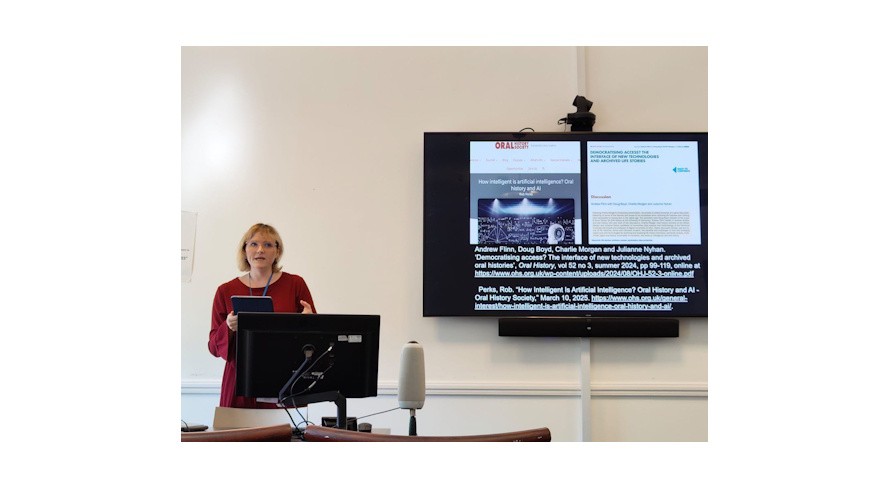HDSM at the DigiCAM25: Born-Digital Collections, Archives and Memory
2025/04/11
On 2-4 April 2025 in Senate House, University of London DigiCAM25: Born-Digital Collections, Archives and Memory Conference took place. At the conference Prof. Julianne Nyhan gave a presentation titled “On the born-digital turn in oral history: recharting and reimagining the cultural circuit?” together with Andrew Flinn. The focus of this international conference was to further an interdisciplinary discussion on how the born-digital transforms what and how is researched in the humanities, with the help of practitioners shared their valuable insights gained from working with born-digital materials.

The full program of the conference talks can be accessed here.
More about DigiCAM25: Born-Digital Collections, Archives and Memory Conference you will find here.
The abstract of the talk is as follows:
Oral history is a complex mediator of cultural memory. It is often filtered and articulated through accounts of personal, subjective recollection, yet it participates in a wider ‘cultural circuit’, where personal recollection can shape, and is shaped by external social and cultural processes, memories and events (see e.g. Summerfield 2016). Until recently, the main representational modality of oral history tended to be the human-generated transcript, often captured in a digital file. Recent and high-profile developments in AI research, involving, for example, foundation and reinforcement learning models, transformer blocks and neural networks are giving rise to a range of systems whose applications extend to oral history as much as any other domain. Next generation Automated Speech Recognition systems like that of OpenAI Whisper, offer, for some languages significantly improved accuracy levels. Yet they present new kinds of problems for oral history, creating born digital resources that may contain instances of hallucination ((openai/whisper and jongwook 2023). Via instances like ChatGTP, the possibility of entirely born digital, machine-generated oral histories has now arisen, even if so far research has focused on search and accession applications (e.g. Švec et al. 2024). In this paper, we will examine the issues of authority, ownership and verifiability, and other technical, legal and ethical challenges, that the born-digital turn in oral history poses. Furthermore, we will consider how the approach we have described as Multimodal Digital Oral History (MDOH) (Smyth, Nyhan and Flinn 2023), which seeks to actively engage with oral history artefacts in all their representational modalities: transcript, sound, waveform, metadata and more, might be extended to incorporate the issues raised here, likewise questioning whether the so-called ‘cultural circuit’ of oral history might now be extended to consider how oral history and born-digital technologies may co-constitute each other, in ongoing interchange, in the years to come.
References
openai/whisper, and jongwook (2023a) “Large-v3 Release #1762.” https://github.com, November 6, 2023. https://github.com/openai/whisper/discussions/1762.
Summerfield, Penny. “Oral History as an Autobiographical Practice.” Miranda. Revue Pluridisciplinaire Du Monde Anglophone / Multidisciplinary Peer-Reviewed Journal on the English-Speaking World, no. 12 (February 24, 2016). https://doi.org/10.4000/miranda.8714.
Švec, Jan, Martin Bulín, Adam Frémund, and Filip Polák. “Asking Questions Framework for Oral History Archives.” In Advances in Information Retrieval, edited by Nazli Goharian, Nicola Tonellotto, Yulan He, Aldo Lipani, Graham McDonald, Craig Macdonald, and Iadh Ounis, 167–80. Cham: Springer Nature Switzerland, 2024. https://doi.org/10.1007/978-3-031-56063-7_11.
Smyth, Hannah K, Julianne Nyhan, and Andrew Flinn. “Exploring the Possibilities of Thomson’s Fourth Paradigm Transformation—The Case for a Multimodal Approach to Digital Oral History?” Digital Scholarship in the Humanities 38, no. 2 (June 1, 2023): 720–36. https://doi.org/10.1093/llc/fqac094
